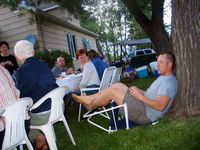
Ok kids, here's a gem that my boss came across while in a waiting room in London, ON. A full page Q+A with Pokey. I have the actual paper, but found this on the web and pasted it here. I'll be sure to share it as much as I can. Even he was surprised by this one. By the way that Pic was by the Pokey-man aswell.
Assignment: Kandahar
Canadian troops assume a dangerous combat role in Afghanistan
"Pokey" of The Canadian Press is reporting on the activities of the Canadian forces as they assume a leading role in the security campaign in Afghanistan. What's Up? asked him for a rundown on what life is like for the soldiers serving there.
Question: What are the living quarters of the Canadian troops like?
Answer: Right now they have all sorts of living quarters. Some are living in eight-person tents that are spacious enough that everybody has a private two-metre-by-two-metre space. Others are crammed into BATs (the soldiers' acronym for Big-Assed Tents) where a couple hundred of them sleep in bunk beds and have no space at all. They all have access to hot showers and flush toilets.
Q: What's the weather like?
A: The weather is very pleasant right now, reaching into the 20s during the day and just below 10 at night. It rains occasionally, creating a lot of mud on the base. In a month or two, the temperature will reach above 40 during the day.
Q: What does a soldier do in an average shift?
A: There is no average shift. There are more than 2,000 soldiers on the base and almost as many jobs. About half of them are considered front-line soldiers. Some drive armoured vehicles, others patrol the countryside on foot and many are trying to chase down insurgents. The army has many trades, including cooks, drivers, mechanics, medics, administrators, planners, engineers, doctors, nurses, lawyers, police officers and many more.
Q: Do they get time off?
A: The soldiers have a little bit of time off during your average week. They have "Sunday routine," which isn't usually an entire day off but maybe half a day off, or just a lighter workload. It's the day many soldiers use to wash clothes, go to the gym or get extra sleep. Halfway through their tour of duty the soldiers get about two weeks off. Most go home for a quick visit, while others will go on vacation in places in Asia or Europe.
Q: What's the food like?
A: The food is good and bad. At the main base at Kandahar airfield, the food is supplied by a giant American company that serves many deep-fried foods and vegetables that aren't very good. At Camp Nathan Smith where a smaller group of Canadian soldiers are living, the food is cooked by Canadian soldiers. It's much better. The soldiers had poutine the other day, but they always have many healthy choices too. But at least the soldiers on the base have hot fresh food. The soldiers who are out in the hills eat meals like macaroni and cheese and stew right out of tin foil packets.
Q. How do you think most soldiers would describe the assignment? Boring? Scary? Challenging?
A: It depends. It's challenging for most of them. It's probably most scary for the soldiers who spend most of the time off base, such as the infantry troops. However most of those soldiers say they are happy to use their training. More than half of the soldiers never leave the base during their tour. Some of them do get pretty bored after a while.
Q: What are some of the biggest challenges they face?
A: For the soldiers who go on patrols the challenge is pretty obvious: to stay safe from attackers while doing their jobs. It's not easy. Many other soldiers have major projects, like building places for the soldiers to stay, that must be completed very rapidly. Almost all of the soldiers work very long hours, so staying healthy and well-rested is difficult for them.
Q. Do the troops mix much with local residents?
A: Because of the danger in southern Afghanistan, only a small number of the troops mix with local residents. The army's provincial reconstruction team in Kandahar probably mixes the most, working on projects to help rebuild the city.
Q: How do Afghans treat the Canadians?
A: The reception is very mixed. A small number of Afghans are trying to kill Canadians. Among the average people on the streets, some people smile and are friendly. Others throw rocks.
Q: Can soldiers keep in contact with families and friends in Canada?
A: The soldiers can send mail home. They can also get on the Internet to send e-mails or chat online and they can also use the telephone to speak with their family members.
Q: Are most of them looking forward to going home?
A: Yes. Even though they've barely started their mission, most soldiers miss home and their families.
Q: Do the Canadian soldiers do anything to make the base seem more like home?
A: They have a big tent they call "Canada House" where they can drink coffee, play foosball, borrow videos and watch TV. They also have a big cement pad where they play ball hockey. There is another big tent run by the American army where soldiers can play Xbox and eat free snacks 24 hours a day. They can also go shopping at an American store called a PX that has almost everything, including footballs, DVD players, Game Boys and CDs.
Q: For a journalist, what is the most challenging part of this assignment?
A: The most challenging part is figuring out the safest way to get stories. It's also a challenge to work with the military. The army is a big machine with many parts and finding out what is going on is not always easy.

1 comment:
Interesting post. Thanks, Jeremy
Rachelle
Post a Comment